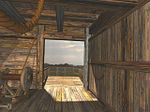“And Abraham said to God,
'Oh, that Ishmael might live before You!'”
(Genesis 17:18)
Similarly, what about Abraham, stuck between two women and with a child from the second? Once Hagar came back, how uncomfortable was it for him? Was he secretly glad she was back? And what about the boy? After all, it was his son. Did he play with Ishmael, at least as much as any ninety year old man could? This too, we don’t know. It seems pretty clear that Abraham maintained some kind of affection and affinity towards the boy. Moreover, it seems that Abraham still had a belief that, though it had been a mess, Ishmael would still be the one through whom God would bless and create a nation of people. Even after God told Abraham that he would bear a child with Sari, he fell on the ground laughing hysterically with mock. And why wouldn’t that be his first response? He’s ninety-nine years old and as the writer of Hebrews puts it, “as good as dead.” This statement doesn’t seem to refer so much to his physicality and age, but to his sexual potency. He was as good as dead and things weren’t working like they used to. And, even if things were in youthful working order, Sari was “barren” (Genesis 11:30), physically unable to conceive and bear child. Two strikes: one, the old man and two, the barren women. Interestingly, God doesn’t seem to be the least bit concerned or waved by these two longstanding realities of the human degeneration. For God is full aware of man’s dilemma and He is fully capable of intervening.
Once again, Scripture doesn’t give all the psychological factors of Abraham’s response to God. We don’t have a “faith meter” in the margin of our Bible showing where Abraham’s faith in God to do the miraculous was in all this. All we know, he laughed hysterically at the impossibility of matter and the image that it brought to his mind.
The second thing we have is Abraham’s response, "Oh, that Ishmael might live before You!"” Emphatically, declaratively and with great emphasis Abraham pleaded, asked that Ishmael could be that one. “Oh that!, might it be!, I pray thee!, if only!, would that!”
What was Abraham thinking? Was there so little faith to believe that God could revive his youthful mortality and heal his barren wife? Or was there something else? Had the young boy Ishmael captured a special place in his hear? Did he foresee future complications and conflicts if there was to be another son, by another women, this time Sari his wife?
There seems to be some doubt in his reproductive abilities. There also seems to be some endearment that the boy held in Abraham’s heart. After what happened with Sari and Hagar the last time and him in the middle, there could definitely be some complications on the horizon. Abraham, like most men, would much rather live in “false peace” than in between two emotional women, each pulling for his affection and attention. Above all else, Ishmael made more sense, he was already there, and it would definitely be easier and more convenient.
But, isn’t the way of the flesh (soul) always more easy, at least to the human mind, eye, heart and desires? Once we have acted in the flesh and external consequences are at hand, one’s natural tendency is to desire to live with the flesh. To incorporate obedience at this point, will result in a tension for sure between flesh and spirit. Therefore, it is often much more easier to ask God to allow our desires to live and to bless them, then to incorporate the desires of the spirit. Be sure the flesh child will always be there to remind us.
For now all we know is that there’s a child on the way, to be born within a year at the “appointed time.” (Genesis 17:21; 18:14)





